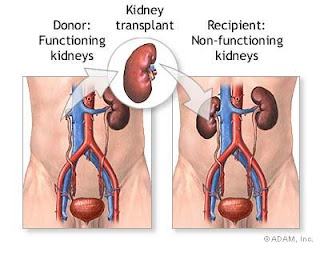 In starting this blog, I had a few goals, one of which was to shed light on transplantation and organ donation. Hopefully to share my experiences and learn from others. So here's a bit of info on kidney transplantation.
In starting this blog, I had a few goals, one of which was to shed light on transplantation and organ donation. Hopefully to share my experiences and learn from others. So here's a bit of info on kidney transplantation.
A kidney transplant is a life saving procedure that enables a person who has lost majority of their kidney function to return to good health. It is one of those things that you can call a medical miracle where doctors and researchers have been able to find a way to replace a person's (the recipient) diseased part with one from another person (the donor).
The process involves major surgery wherein doctors remove a healthy kidney from the donor and place it into the recipient's body to let it function in the place of the diseased kidneys. The donated organ is often placed in the front around the lower abdomen area, either to the right or left side of the belly button, while the native kidneys are often left as is.
Kidney transplants are made possible because though we are born with two kidneys, and like our lungs, we only need one in order to live well.
Doctors often categorize their kidney transplant patients based on the relationship between the donor and the recipient. The kidney may come from either a living person (living donor) or someone who is deceased, in this case called a cadaver donor. Another classification is whether the donor is a relative or not, the donor may be a living-related or living-unrelated donor.
The reason for such classifications is that statistically, it has been observed that in general, live organ donations perform better and last longer than kidneys from cadaver donors. Similarly, living related donors are preferred over non-related donors, because the genetic makeup is closer between the two individuals.
For majority of the cases, the data holds true. From my experience however, I've seen quite a number of kidney transplants who have passed the twenty-five year mark with cadaver donors. So for me, a living related donor gives you a good start, but there a lot of other factors involved before, during and after the transplant operation that doesn't always make this true.
Another thing my docs have always stressed is that transplant medicine has come such a long way to that point that to a certain degree, it is able to swing the odds to the kidney transplant recipient be it living or deceased, related or non-related donor.
Wednesday, August 12, 2009
Kidney Transplantation Intro
Subscribe to:
Post Comments (Atom)
No comments:
Post a Comment